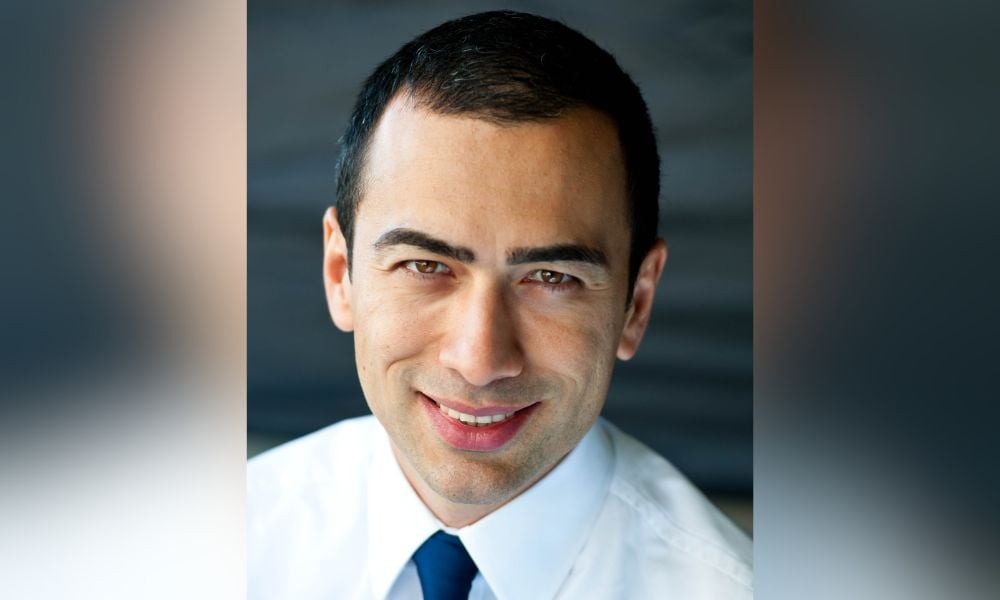
The Yunusov Question features interviews with prominent lawyers and judges

Pulat Yunusov started a YouTube show and podcast in the summer of 2020 because he was bored and lonely. People were too nervous to meet in person, and coffee and drink dates started occurring over Zoom, a medium which rapidly lost its “stigma,” he says.
“People prefer to meet in person. It was inconceivable to have a court hearing on Zoom before the pandemic. It was really rare to have hearings over the phone.”
Suddenly, everything switched to videoconference, and people even began to appreciate its convenience. Yunusov says this norm shift helped get his show The Yunusov Question off the ground.
He started interviewing his friends about their legal practices, and slowly branched out to legal professionals outside of his network.
His interviewees include retired Chief Justice of Ontario George Strathy, Associate Chief Justice of the Court of Appeal Michal Fairburn, and renowned litigator Earl Cherniak. He has also interviewed recently appointed Superior Court Justice Ranjan Agarwal, criminal lawyer Harpreet Saini, litigator at Adair Goldblatt Bieber Jordan Goldblatt, and Superior Court Justice Andrea Himel, who sits on the Family Court Branch.
“They don't have to do them every day – It's impossible. But someone who routinely does extremely hard things really well, that's my ideal guest.”
The conversations that have most stood out to Yunusov are his interviews with former Chief Justice of Canada Beverley McLachlin, Henein Hutchison Robitaille LLP’s managing partner Danielle Robitaille, and Superior Court Justice Fred Myers.
The talk with Justice Myers is the show’s most popular so far. Yunusov says that every episode has an underlying lesson, and Myers’ was about how lawyers must be mindful of the constraints within which justice must materialize in the court process. He discussed how a good advocate respects the needs of the judiciary while doing everything they can for their client. Junior lawyers – and Yunusov says he once fell into this category – “go all out” for their clients in a way that often ignores the strain on an overburdened, overworked judiciary. They believe that any issue raised must be resolved, any request made must be met, and they dump as many materials as they believe is necessary on judges – “Because isn't that what justice is?” says Yunusov.
A court hearing is a “high-stakes presentation,” which Yunusov compares to a start-up company making a pitch to investors. In that situation, founders are not going to dump 1,000-2,000-page documents on potential investors and expect them to read it.
Lawyers must understand that “everybody is acting within constraints, whether it's judges, or the police, or the court staff, or lawyers themselves,” he says. “We have to find justice within those constraints.”
“Until lawyers understand that, they will be at a disadvantage as advocates.”
By interviewing so many judges, Yunusov says he can take some credit for making the practice more acceptable in Canada. Beverley McLachlin expressed the vision in her autobiography Truth be Told that the Canadian judiciary must be more open to the public, and the current Chief Justice Richard Wagner has carried on that torch, he says.
Yunusov’s conversation with Robitaille cast lawyers is a different light than they are often portrayed, he says. Instead of machines who are always cautiously guarded in what they say, her openness and friendliness made lawyers look like “regular people,” smart people who “sometimes do extremely hard jobs.”
Recently, Yunusov interviewed securities litigator and former Law Society of Ontario Bencher Joseph Groia. They did a “deep dive” into Groia’s battle with the law society over its finding of professional misconduct for incivility, which went all the way to the Supreme Court of Canada and became foundational in the law of professional ethics for lawyers.
Every episode of The Yunusov Question has an instructive takeaway that would be helpful to lawyers, especially young lawyers, Yunusov says. He is now trying to figure out how to bring the show to more people.
Before law, Yunusov was a software engineer. Encouraged by his wife, he went to law school with the understanding that it would be a fitting profession for someone who wanted intellectual work and to be their own boss. He started his own practice a few months after being called to the bar in 2011.
Yunusov’s practice is focussed on civil and commercial litigation. He started with small claims and landlord and tenant cases, and his files have grown with time. His clients are entrepreneurs and companies with commercial disputes, and he sometimes represents property owners in real estate matters.